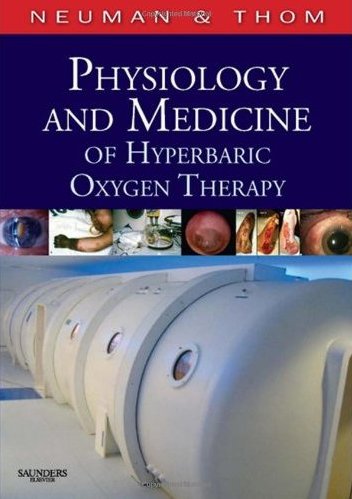The BScMedScHons (Hyperbaric Medicine) degree programme
Module 1: Basic Hyperbaric Medicine
Brief description:
- First of four modules in the hyperbaric medicine degree programme
- Theoretical training provided via the internet - web-based guidance through the text book and other downloadable documents.
- Contact time of seven days - includes a weekend.
- Practical training in the techniques of examining patients for HBO therapy.
Training outcomes:
Upon successful completion of this module, the candidate will be able to examine a patient and provide an evidence-based decision on the need for HBO therapy for the patient.
Theoretical training:
 Textbook: "The Physiology and Medicine of Hyperbaric Medicine" - by Neuman & Thom.
Textbook: "The Physiology and Medicine of Hyperbaric Medicine" - by Neuman & Thom.
ISBN: 978-1-4160-3406-3
This book is available for purchase from many online dealers, e.g. Best Publishing orAmazon.
The students are guided through the textbook by means of prescribed readings of certain chapters in the textbook and additional downloads where certain themes are not covered adequately in the textbook. This can be done at any time and place the student prefers, as well as at a pace that is comfortable. You can test your knowledge by completing online self-tests (with specific guidance in the case of incorrect answers) and after a theme is mastered, you can write the summative assessment for that specific theme (each summative assessment ranges between 5 minutes and 20 minutes).
Practical training:
The practical training concentrates on the physical examination of patients, thus looking in more details at specific special investigations that are needed in the analysis of whether the patient will benefit from HBO or not. Skills like Transcutaneous Oxygen Monitoring (TCOM) and other vascular assessments are addressed, as well as a brief overview on fitness for hyperbaric exposures, e.g. lung function testing, etc.
Another part of the practical experience is the observation of an HBO session. This will ensure that candidates have a good idea of what an HBO treatment consists of and how this link with the initial evaluation of the patient.
There is no hyperbaric chamber dive prescribed for successful completion of this module - however, students who do have a medical certificate of fitness for hyperbaric exposures may experience the treatment session first-hand by entering the chamber with the patients.
Entry requirements:
Each prospective candidate must:
- have the MBChB degree or any other equivalent degree that enables him or her to register as a medical practitioner.
- be registered with the Health Professions Council of South Africa, or an equivalent international professional body that registers medical practitioners (e.g. GMC in the UK)
- have completed his/ her internship year(s).
- have access to the internet or the ability to gain access
- be able to browse the internet training site
The following are NOT requirements:
- Being a diver (recreational or commercial)
- Being medically fit for hyperbaric exposures.
Observers:
Persons who do not meet the requirements for entry into the module may in specific circumstances be allowed to participate in the module as an observer. These circumstances are:
- Should have a medically-related qualification (e.g. nursing care or emergency care)
- Must be actively involved in hyperbaric medical practice with a medical practitioner (e.g. helping with side-room investigations or chamber treatments)
- Must have a referral letter from a hyperbaric medical practitioner (including motivation for attendance)
- Subject to an interview with the programme coordinator.
Note 1: Observers may NOT receive ANY certification when attending the module. The person attends the module purely for personal enrichment. Certificates of attendance are NOT issued!
Note 2: Observers are by definition not medical practitioners. This module trains medical practitioners to apply knowledge they already have (e.g. ability to do a clinical examination of a patient, ability to read X-rays, ability to interpret lung function tests, interpret blood results, etc.). Students who do not at least have a basic knowledge of these will either waste their own time because they don't understand what is said in class, or they would want to ask a lot of questions in class, which will waste the time of the attendees.
Logistical help provided:
Once a student is registered for the degree programme (or a module), (s)he will have secure access to the Webstudies programme. Various links provide information for students regarding accommodation options that we suggest, as well as general information about the contact time.
Specific links are available for international students, telling them all about the weather, money matters, visa requirements and resources, etc.
Examination:
The examination of this module is done in various stages. The first stage is done via Webstudies (summative assessments). On the last day of the contact session, the students will also write a theoretical examination. This consists of a number of patient evaluation exercises (on paper) with related theoretical questions.
Students enrolled for the degree programme will write an examination at the end of their study period, to test their ability to integrate knowledge across all modules.
Certification:
Students who successfully complete the module, will receive:
- Certificate of competency from the Stellenbosch University
- CPD/ CME certificate from the Stellenbosch University
Accreditation:
This module is accredited with:
- The South African Department of Education
- The Health Professions Council of South Africa
- The European College of Baromedicine (ECB)
- The European College for Hyperbaric Medicine. (ECHM)
- The Stellenbosch University for CPD points.
Recognition of Prior Learning (RPL):
RPL is provided to any candidate who had previously done a course or training programme in hyperbaric medicine. The Stellenbosch University has specific policies and procedures relating to RPL of a student. Contact the programme coordinator for more information.
Contact details:
For more information, please contact Dr Jack Meintjes, the programme coordinator:
Att: Dr WAJ (Jack) Meintjes
Department of Interdisciplinary Health Sciences
Community Health
PO Box 241
CAPE TOWN
8000
South Africa
Tel: +27 21 938-9272
email: wajm@sun.ac.za

